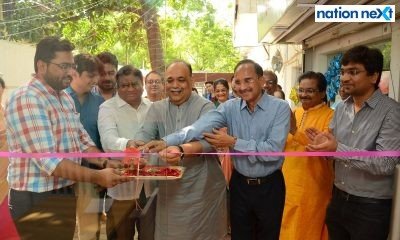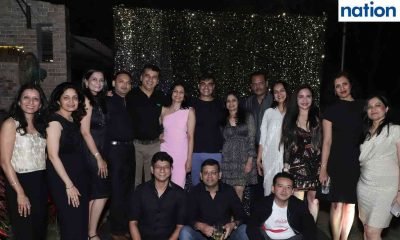National News Health
‘Cardiac Arrhythmia’ Everything you should know | Health at Nation Next

Representational Image
What exactly is Cardiac Arrhythmia?
A cardiac arrhythmia is any abnormal heart rate or rhythm. In normal adults, the heart beats regularly at a rate of 60 to 100 times per minute. And the pulse (felt at the wrist, neck or elsewhere) matches the contractions of the heart’s two powerful lower chambers, called the ventricles.
The heart’s two upper chambers, called the atria, also contract to help fill the ventricles. But this milder contraction occurs just before the ventricles contract, and it is not felt in the pulse.
Under normal circumstances, the signal for a heartbeat comes from the heart’s sinus node. It’s the natural pacemaker located in the upper portion of the right atrium. From the sinus node, the heartbeat signal travels to the atrioventricular node or A-V node, which is located between the atria.
Next the signal travels through the bundle. It’s made up of a series of modified heart muscle fibers located between the ventricles. The signal enters the muscles of the ventricles. This causes the ventricles to contract and produces a heartbeat.
Cardiac arrhythmias sometimes are classified according to their origin as either ventricular arrhythmias (originating in the ventricles) or supraventricular arrhythmias (originating in heart areas above the ventricles, typically the atria). They also can be classified according to their effect on the heart rate, with bradycardia indicating a heart rate of less than 60 beats per minute and tachycardia indicating a heart rate of more than 100 beats per minute.
There may not be any symptoms, or it may cause palpitations (awareness of a rapid heartbeat), low blood pressure and fainting.
Diagnosis
Your doctor will ask about your family history of coronary artery disease, cardiac arrhythmias, fainting spells or sudden death from heart problems. Your doctor will also review your personal medical history, including any possible risk factors for cardiac arrhythmias (such as coronary artery disease, cardiomyopathy, thyroid disorders, and medications). You will be asked to describe your specific cardiac symptoms, including any possible triggers for those symptoms.
During the physical examination, your doctor will check your heart rate and rhythm, together with your pulses. This is because certain cardiac arrhythmias cause a mismatch of the pulse and the heart sounds. Your doctor also will check for physical signs of an enlarged heart and for heart murmurs, one sign of a heart valve problem.
A test called an electrocardiogram (ECG/EKG) often can confirm the diagnosis of a cardiac arrhythmia. However, because cardiac arrhythmias may come and go, a one-time office EKG may be normal. If this is the case, an ambulatory EKG may be required.
During an ambulatory EKG, the patient wears a portable EKG machine called a Holter monitor, usually for 24 hours, but sometimes much longer. You will be taught to press a button to record the EKG reading whenever you experience symptoms. This approach is especially useful if your symptoms are infrequent.
Prevention
Cardiac arrhythmias that result from coronary artery disease can be prevented by taking the following actions to modify your risk factors:
– Eat a heart healthy diet, including eating an abundance of vegetables and fruits, fish, and plant sources for protein and avoiding saturated and trans fats
– Control your cholesterol and high blood pressure
– Quit smoking
– Control your weight
– Get regular exercise
When to call a professional
Call your doctor if you have any symptoms of a cardiac arrhythmia, including palpitations, dizziness, fainting spells, fatigue, shortness of breath and chest pain. Call for emergency help immediately whenever someone in your family develops a severely irregular pulse. If you cannot feel a pulse at all, and the person is not breathing, perform CPR until emergency professionals arrive.
When you need EP study and RF ablation?
An electrophysiology (EP) study is a test used to understand and map the electrical activity within your heart. An EP study may be recommended in people with heart rhythm problems (arrhythmias) and other heart problems to understand the exact cause and determine which treatment is most likely to be effective. An EP study involves placing diagnostic catheters within your heart and running specialized tests to map the electrical currents.
Catheter ablation is a procedure that uses radiofrequency energy (similar to microwave heat) to destroy a small area of heart tissue that is causing rapid and irregular heartbeats. Destroying this tissue helps restore your hearts regular rhythm. The procedure is also called radiofrequency ablation.

Dr Chetan Rathi is a consultant cardiologist and cardiac electrophysicist at Hrudayam Heart Care and Arrhythmia Clinic in Nagpur. After 3 years training in Cardiology in Mumbai; he was trained in the field of Electrophysiology under the eminent Professor Dr Yash Lokhandwala.
Health
Union Minister Dr Bhagwat Karad unveils Dr Kavita Chandak’s book ‘Healing women with Homeopathy’

Dr Kavita Chandak at National Conference of Homeopathy held in Aurangabad
Minister of State for Finance Dr Bhagwat Karad recently unveiled Dr Kavita Chandak’s book ‘Healing women with Homeopathy’ at the recently held National Conference of Homeopathy (HAMI 2022) in Aurangabad. Prominently present during the conference were renowned homeopath Dr Arun Bhasme and 3,000 other doctors.
In her book, Dr Chandak, who hails from Nagpur, has covered the most important and widespread gynecological disorders such as menarche, over dysmenorrhea to menopause; reflects issues from which women suffer frequently like sterility, polycystic ovarian syndrome, breast issues, pregnancy-related conditions like constipation, morning sickness, heartburn, uterine prolapse, varicose veins, hemorrhoids, and urinary problems, to mention a few.
Dr Chandak has also given a thorough explanation on topics like cancer of the breast, uterus and cervix, which are the most prevalent types of cancers in women. Her book contains a study of several homeopathic remedies with special emphasis on gynecology through the chapters like the core of a few important female remedies and the homeopathic gynecological kit. The book also gives a glimpse of rare and lesser-known remedies.
It is worth noting that Dr Chandak holds two golden book world records for treating kidney disorders and a case of mucormycosis. She is also the recipient of ‘The Excellence in Homeopathy award 2022’ given by Hpathy.com to 66 renowned homeopaths throughout the world. Over the years, Dr Chandak has organized more than 800 free medicine distribution camps. She provides her services through her web clinic in 20+ countries. Her area of specialization is behavioral psychiatric disorders like autism and ADHD.
Health
COVID से बचने के लिए mask पहनने का सही तरीका क्या हैं? | Healthy India
Pulmonologist Dr Sameer Arbat explains the right way to wear mask in order to protect ourselves from COVID-19.
Health
‘No cause for concern:’ Sharad Pawar after testing COVID positive

Sharad Pawar
-
Health5 years ago
Amphoterecin B, used for treating black fungus, to now be manufactured in Nagpur
-

 Social4 years ago
Social4 years agoPoliticians, businessmen shower blessings on Chandrashekhar Bawankule’s son Sanket at his wedding reception
-

 Social4 years ago
Social4 years agoNagpur gets its first 7 am cafe ‘SEVEN O’ ELEVEN’ at Shraddhanand Peth
-

 Parties4 years ago
Parties4 years agoCouples have a blast, win awards at ‘Hollywood Oscar Night’ in Nagpur
-
Who´s Partying Next To You9 years ago
Nagpur brings in 2017 in style at Gondwana Club
-

 Parties4 years ago
Parties4 years agoFamily, friends ‘wine n dine’ at Dr Shilpa Mukherji’s birthday bash in Nagpur
-
Who´s Partying Next To You8 years ago
Party revelers make noise at Nagpur’s first silent party on New Year Eve at Gondwana Club
-

 Social4 years ago
Social4 years agoSunil Kedar kicks off 10-day Late Dr Shrikant Jichkar Memorial Cricket Tournament in Nagpur








